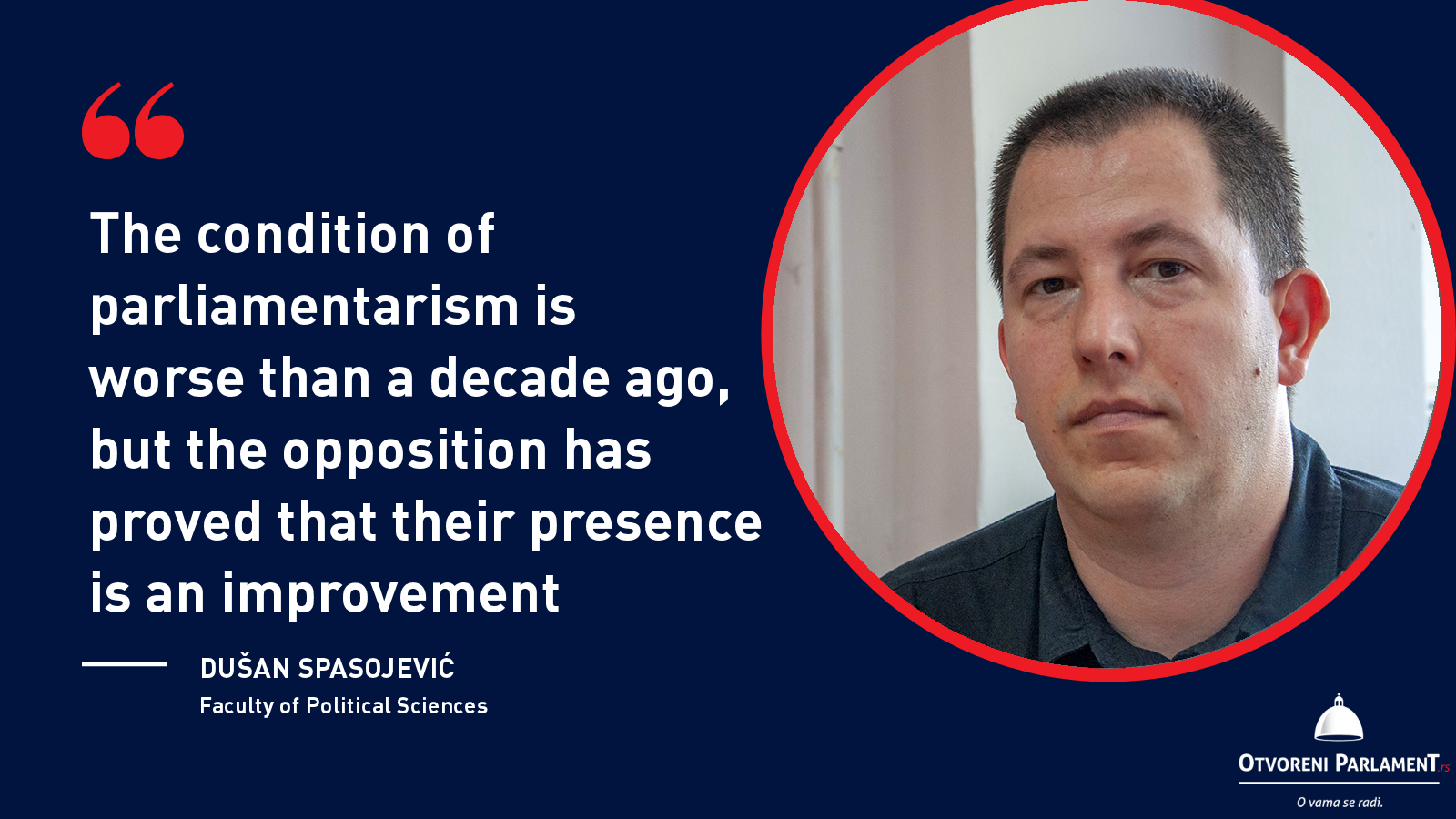
The degree of parliamentarism in Serbia is lower than a decade ago, and even then, it wasn’t on a satisfactory level. The opposition has a narrow span of influence, but its presence is definitely an improvement. Boycotts and blockades should be used only in extreme cases and when they can be completely followed through. The divides in the opposition, while bad, are fundamentally irrelevant. Mirjana Nikolić, a parliamentary reporter for the Open Parliament and Istinomer, has discussed these subjects with Dušan Spasojević, associate professor at the Faculty of Political Sciences.
The Open Parliament: Early parliamentary elections have already been announced in the media, and while they are always important, what is the atmosphere they will take place in, in context of parliamentarism in Serbia in the last decade?
Spasojević: The degree of parliamentarism was not really high even when this government started its first mandate, ten or 11 years ago, but it is definitely even worse off now. Dominance of one party, constant breaking of parliamentary principles, a narrowing space for any oppositional activity are the characteristics of the Serbian parliament. It seems that this will not change until the balance of power in the political scene changes.
The Open Parliament: Is this where the reason for a huge discrepancy in the work atmosphere of the Belgrade and Republic Assembly lies? Is the atmosphere in the Belgrade Assembly calm because of the Speaker Nikola Nikodijević, and tense in the Republic Assembly because of the Speaker Vladimir Orlić; or is the reason that the ratio of the ruling majority and the opposition in the Belgrade Assembly is almost 50:50?
Spasojević: While some things are personal and depend on the personal interpretation of the function a person holds, the ratio is what makes all the difference. Nobody would be as confident and impudent as the Speaker of the National Assembly if they had a majority by one or two MPs or councilors. Structural elements always take precedence over the personal, because the fact that somebody fulfills their role in a likable or unlikable way cannot fundamentally change the ratio of power and the behavior of MPs.
The Open Parliament: The 2020 election boycott was a direct result of an intolerable atmosphere in the plenum in that convocation, which was followed by a short convocation with no opposition whatsoever, and since last year the opposition is back. Did the return of the opposition in this convocation prove the importance and potential of the parliament as an institution?
Spasojević: If we compare these three examples, I think it’s crystal clear how important it is for the opposition to be in the parliament and to use its span of influence, however narrow it may be. In that context, I would like to say the opposition MPs did the most they could have done with the chance they got. The parliament was in the public limelight much more than in recent years, important subjects were mentioned and you could tell how important of a mechanism this institution is. The best example would be how the wave of “Serbia against violence” protests developed parallel to the discussion in the parliament on what happened in the elementary school “Vladislav Ribnikar” and in Mladenovac, so you could say that the opposition used its place in the parliament to instigate discussion on these events. Of course, their position is far from ideal and sometimes they feel the need to resort to more radical means, such as this most recent boycott of the session, when the budget rebalance was being considered. It maybe was not the most logical and well thought through thing to do, and it did not cause the effect they hoped for, but I feel the need to understand them as people - they are being constantly attacked and pressured by the ruling majority and they had to react in some way.
The Open Parliament: Is it better that the opposition comes to an agreement to set a good example and speak exclusively about the agenda, on any sittings or sessions that may take place this fall, or is that impossible with this ruling majority?
Spasojević: The problem with boycotts and blockades is that if you’re not able to see them through completely you come off as weak, and that was the result of this most recent attempt. It is my impression that the opposition produces a greater effect if they stick to the topic and participate in parliamentary life, because that is easier to understand for the viewers that tune into the live broadcasts of plenary sittings. Non-institutional mechanisms and rebellions should be the last resort, for situations like for example a few months ago when minister Aleksandar Martinović insulted certain MPs. Situations like that call for a certain kind of a rebellion, and they did achieve their goal, he left the sitting…
The Open Parliament: Some opposition parliamentary groups are disassembling, some new ones are being created, the Open Parliament follows these developments closely, but there is a lingering feeling that not many people are informed about these fluctuations. Does it matter which MP belongs to which parliamentary group, or the citizens don’t know and don’t really care who belongs to which party?
Spasojević: It’s bad when the opposition, especially the opposition that will, sooner or later, have to cooperate, divides among themselves and especially when it does it in a way confusing for the public. That is something they need to watch out for in the future. Nonetheless, the political relevance of those fluctuations should not be exaggerated. Only a narrow, professionally involved and interested public can actually follow some of those divisions and understand what happened there, while the broader public, that is leaning towards parties in the opposition, does not know and is not interested in all the political actors. The party affiliation as such is not so important for the voters.